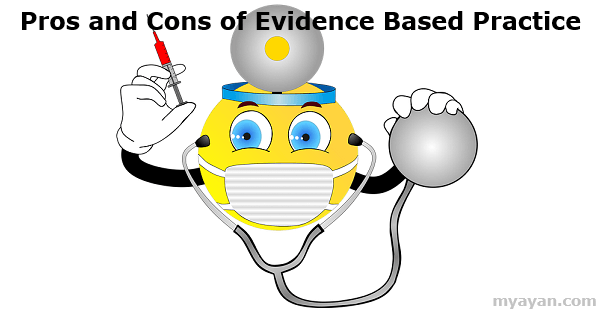Every study in medical sciences is based on Evidence-Based Practice (EBP) is the application of such evidence to patient care. It is a multidimensional process involving clinical expertise and research to select best practices for healthcare. Today, EBP has emerged as a powerful tool in the healthcare delivery system. However, like any other approach, there are both pros and cons of Evidence based Practice. The main motive of this guide is to help you understand the same.
Most medical conditions can be diagnosed and treated with the help of EBP. Thus, if it were not for EBP, treatments would not be possible. Some of the pros of Evidence based practice include:
One of the primary benefits of EBP is improved quality of care. Clinicians can identify the root cause of medical conditions based on the latest research findings. This way, they can have better patient outcomes and higher patient satisfaction.
EBP helps to reduce unwarranted variation in clinical practice. When there is a consensus on what works best, clinicians can standardize their practices, leading to consistent care and improved outcomes.
EBP helps organizations make more informed decisions and reduce their costs regarding resources and time. By using evidence-based research, healthcare providers can identify appropriate interventions and treatments most likely to provide positive outcomes for their patients while minimizing financial expenditures.
This approach encourages practitioners to take a more active role in their professional growth and development. Professionals can research best practices, familiarize themselves with the latest advances in medical science, and actively seek new information that can help improve patient care.
Through EBP, healthcare organizations can ensure that their practitioners are always up-to-date with the latest advances in medical science and can provide the best care possible to their patients. This encourages professionals to become more active in their own professional growth and development, helping to improve patient outcomes.
EBP leads to improved patient outcomes. By using the best available evidence to inform clinical decisions, clinicians can ensure that patients receive optimal care and achieve better health results.
There are areas where EBP falls short. Some of the cons of evidence based practice are:
EBP can sometimes be viewed as an overly rigid approach that limits the clinical judgment of the practitioner. Clinicians may be hesitant to stray from guidelines or research findings, even if it's in the best interest of their patient.
Some areas of healthcare lack the necessary research to support EBP. This is particularly true for rare conditions or situations that have not been extensively studied. In such cases, clinicians may need to rely more on their clinical expertise and experience.
He practice requires going through rigorous research to determine whether or not a particular medical practice or procedure should be used. Doctors must review multiple studies and consult with other professionals before deciding which action to take. This process can be time-consuming, making it difficult to provide immediate results in medical situations which require quick decisions.
Implementing EBP can be challenging if the necessary resources are not available. This includes access to current research, funding, and technology. Inadequate resources can also limit the ability of clinicians to conduct research or apply research findings in practice.
EBP relies heavily on expert opinion and consensus statements. Since experts may disagree on a particular issue, this may create confusion and uncertainty when it comes to making decisions. It is important to remember that expert opinion is only one component of the decision-making process.
Conclusion on Pros and Cons of Evidence Based Practice
EBP is an excellent way to incorporate evidence from research into decisions in the field of healthcare and medicine. Even though there are Pros and Cons of Evidence-Based Practice, with well-deduced approaches it can be a great implementation.
It is important that educators ensure clinical staff understand how to interpret scientific evidence in order for this methodology to be most beneficial.
Healthcare institutions must take advantage of technology and databases to gain access to a plethora of data to help them make accurate decisions. On the other hand, healthcare providers need to stay up to date on all the new advancements.
As you assess introducing Evidence Based Practice into your organization, keep in mind all these points discussed here, from the basics to drawbacks.

Evidence-based practice has its drawbacks, such as the scarcity of evidence and the tendency to overlook common sense. Additionally, the process of seeking valid and credible evidence can be time-consuming and challenging. However, in order to base our practice on solid ground, it is imperative to have some form of evidence pertaining to our disease, issue, or question.
By keeping healthcare professionals up to date with the latest medical protocols, it enhances their decision-making process, improves patient recovery efficiency, and deepens their understanding of the risks associated with various treatments.
Evidence-Based Practice holds immense significance as it strives to deliver the utmost efficient care, ultimately enhancing patient outcomes. Patients rightfully anticipate receiving the most effective care grounded in the finest available evidence.
Many healthcare professionals face challenges when it comes to implementing EBP. One common barrier is the perceived lack of time. Additionally, there is often uncertainty or limited knowledge about the EBP process, particularly in regards to critiquing and appraising relevant literature that addresses clinical problems. These barriers hinder the widespread adoption of EBP in healthcare settings.